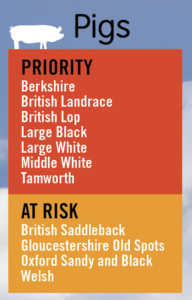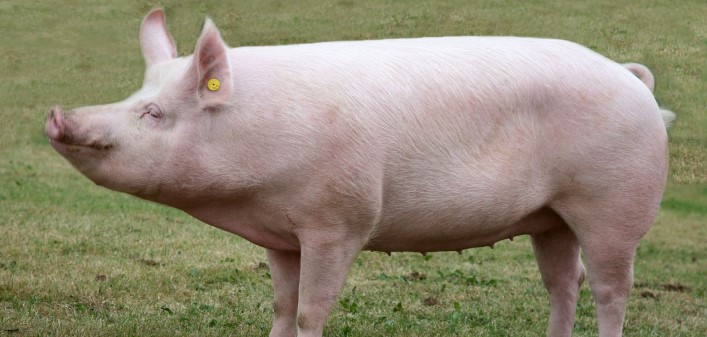The Rare Breeds Survival Trust (RBST) has called on Defra secretary Steve Reed to re-establish the Ministerial Native Breeds Roundtable, after its latest annual Watchlist showed ‘serious concerns’ for a number of very rare livestock and equine breeds.
RBST highlighted encouraging new signs of stabilisation in several very rare breeds which were previously showing declining numbers, including Large White pigs and Gloucester cattle, as evidence of the positive impacts that can be achieved through concerted and co-ordinated action.
The 2025-26 watchlist showed mixed fortunes for some of the UK’s iconic native pig breeds.
- Numbers of Large Whites, or the ‘Yorkshire Pig’, highlighted as a breed of particular concern in the 2022 Watchlist, are now more encouraging, with a 39% increase in female registrations in 2024 compared with the previous year. RBST and the British Pig Association launched a new joint conservation project for this breed in 2022.
- The British Landrace pig, highlighted as a particular concern in the 2023 Watchlist due to steeply declining numbers, is also more stable, with a very welcome 81% increase in the number of female registrations compared with 2023.
- However, the Large Black pig breed saw a 32% decrease in the number of females registered compared with the previous year.
- British Lop registrations in 2024 were slightly higher than 2023. However, the number of sires and dams used to produce this were down in the continuation of a concerning trend from recent years. The ‘Effective Population Size’ has now fallen to a worrying 53.
 Meanwhile, two of the UK’s iconic native sheep breeds – the Manx Loaghtan and the Leicester Longwool breeds – have moved to the most urgent ‘Priority’ category, and there are concerns over White Park cattle numbers.
Meanwhile, two of the UK’s iconic native sheep breeds – the Manx Loaghtan and the Leicester Longwool breeds – have moved to the most urgent ‘Priority’ category, and there are concerns over White Park cattle numbers.
RBST said survival of the UK’s rare native breeds is important for sustainable farming, regenerative land management, biodiversity, food chain resilience and genetic diversity; as well as these breeds’ immense cultural and heritage value.
Rare Breeds Survival Trust Chief Executive Christopher Price said: “It is very positive to see signs of stabilisation in several very rare breeds which were previously showing declining numbers, such as Gloucester cattle and the Large White pig, following concerted conservation activity and breed promotion by breed societies together with RBST.
“However our concern is deepening for others among the UK’s irreplaceable native breeds which are seeing their numbers continue to fall, including the Manx Loaghtan and Leicester Longwool sheep.”
Roundtable
The Ministerial Native Breeds Roundtable was designed to support strategic and co-ordinated action for native breeds, across departments and alongside rare breed organisations, under the previous Government.
Mr Price urged Mr Reed to revive it to ‘ensure that action for native breeds is co-ordinated across government departments, and to provide essential government support for the vital work being carried out day in and day out across the UK by RBST, our dedicated members, and the breed societies’.
He added: “Farmers and smallholders across the UK are demonstrating every day that our native livestock and equines are great breeds for modern times.
“They are selling the highest quality sustainable produce, using native breeds to regenerate the natural environment, and placing their rare breeds at the heart of farm diversifications and recreation enterprises.
“ We are proud to work with these dedicated individuals and breed societies in improving the outlook for rare livestock and equines through scientific research, application of the latest conservation tools and techniques, support for breeding networks, and promotion of these irreplaceable breeds.”
Defra response
A Defra spokesperson said: “Native and rare breeds of livestock provide genetic diversity and are an important part of our rural heritage.
“We will continue to protect our native breeds through the Countryside Stewardship Higher Tier, providing funding to support their grazing habitats, and we will keep working closely with stakeholders to support the sector.”




